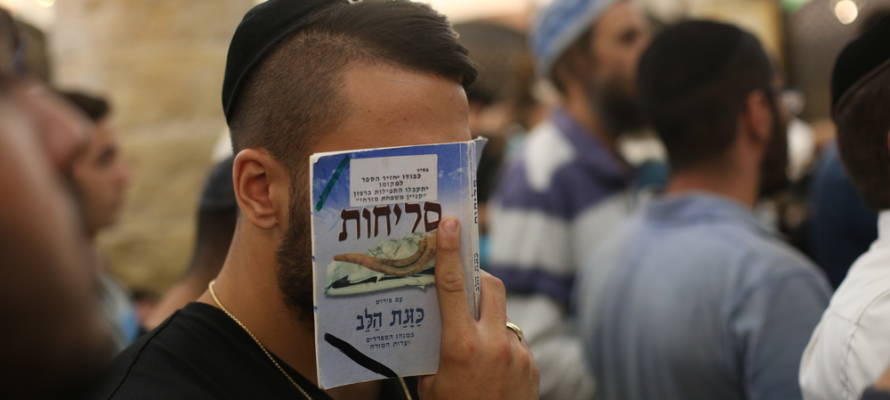Our sages teach that one who repents properly is credited as if he “…went to Jerusalem, rebuilt the Temple, erected the altar, and offered all the required sacrifices.”
By Rabbi Ari Enkin, Rabbinic Director, United with Israel
With the High holidays shortly upon us, repentance is certainly the theme of the season.
Although repentance today consists of prayer and confession, in biblical and Temple times it also included animal sacrifices. Different sins required different types of offerings, different kinds of animals, and different procedures.
Nevertheless, even then, sacrifices didn’t suffice. It is always easy to go through the motions, but to internalize and show the sincerity of our repentance, much more is needed. Scripture tells us that empty sacrifices mean little if not accompanied by prayer and sincere repentance. Take, for example, these passages: “I desire true love, and not just sacrifices, [I want to see] knowledge of God and not just burnt offerings.” (Hosea 6:6), “Return to God with words (prayer)…” (Hosea 14:2), and “[Meaningless] sacrifices and offerings do not delight [God].” (Psalms 40:6)
So, in addition to sacrifices, God wants to hear our prayers and see us performing charitable deeds, both in general and as a form of repentance in particular. This is especially true today, considering that there is are no animal sacrifices and no Holy Temple.
As the Talmud says: “Rabbi Yochanan ben Zakkai was walking with Rabbi Yehoshua after the destruction of the Temple. Rabbi Yehoshua looked at the Temple ruins and cried, ‘ … The place that atoned for the sins of the Jewish people lies in ruins!’ Rabbi Yohannan ben Zakkai comforted him by saying: ‘… We can still gain atonement through acts of loving-kindness.’”
According to an even stronger passage: “Rabbi Elazar said: Doing acts of charity is greater than offering all of the sacrifices, as it is written: ‘Doing charity and justice is more desirable to God than sacrifices.'” (Proverbs 21:3).
Based on the above, our sages tell us that one who repents properly, prays, confesses, and does acts of charity is also credited as if he “…went to Jerusalem, rebuilt the Temple, erected the altar, and offered all the required sacrifices.” In a similar vein, we are told that “Torah study replaces the sacrifices…” Hence, increasing our Torah study is especially encouraged at this time of year.
Repentance is a powerful tool, a gift actually, that ensures we will never be distant from God. Sincere repentance always “works” – a person can always be forgiven when sincerely feeling remorse for his bad deeds and committing to change. As Maimonides says, “Even if a man sinned his whole life, and repents on the day of his death, all his sins are forgiven.”
Here are some of the recommended practices in the process of repentance. First of all, one must confess the sin, regret having committed it, and commit to never repeating it. One way to better ensure that a person won’t repeat a sin is to act in an opposite extreme. For example, one repenting for lying should make extra efforts to only speak the truth. Of course, one must also pray to be forgiven for the sin. And we’ve already discussed the importance of accompanying the repentance process with acts of kindness.
The ‘Ba’al Teshuva’ Movement
On the topic of repentance and change, it is worth mentioning what is known as the “Baal Teshuva Movement,” referring to the return of secular or sinful Jews to Orthodox Judaism. Since the late 1960s, a large number of Jews have found their way back to traditional Judaism. Some have returned to Judaism due to inspirational lectures, online learning, rabbinic influences, or simply self-reflection and realization that a lifestyle without religion is usually a lifestyle with little meaning and satisfaction. The Chabad-Lubavitch, Aish Hatorah, and Breslov movements, to name a few, have an impressively large number of newly religious followers, as well as those who didn’t join them but became religiously committed through their efforts.
One who has taken on a religious lifestyle is referred to as a “Baal Teshuva,” which means “one who has repented” or “one who has returned.” Organizations such as those mentioned above are known as kiruv movements; the word ‘Kiruv’ means ‘to bring close.’
No Proselytizing
One should not confuse the Kiruv/Baal Teshuva movement with any type of proselytization. Proselytization seeks to gain followers from other religions. The Kiruv movement seeks only to make Jews more religiously observant. There is no outreach to non-Jews by Kiruv movements.
Some of the most well-known pioneers and leaders of the Baal Teshuva movement who have passed away in recent years include singer, composer and teacher Rabbi Shlomo Carlebach; author and translator Rabbi Aryeh Kaplan, who was known for his vast knowledge of physics and Kabbalah; and Rabbi Menachem Mendel Schneerson, the late Lubavitcher Rebbe, whose followers are likely the most active in Kiruv worldwide today.

Send Passover Packages to Needy Israeli Soldiers - Bring Them Joy!
We are honored to thank the young men and women of the IDF who risk their lives every day to protect the citizens of Israel. Since October 7th, soldiers have been on the battlefield for months - many are hoping to come home for Passover.
Join us in sending Passover food packages (and personal notes) to Israeli soldiers and their families.
Many soldiers spend the Passover holiday with needy families back home. The soldiers greatly appreciate your love and concern. Bring them Passover joy!
CLICK HERE TO SEND YOUR PACKAGE AND NOTE TO ISRAELI SOLDIERS!




